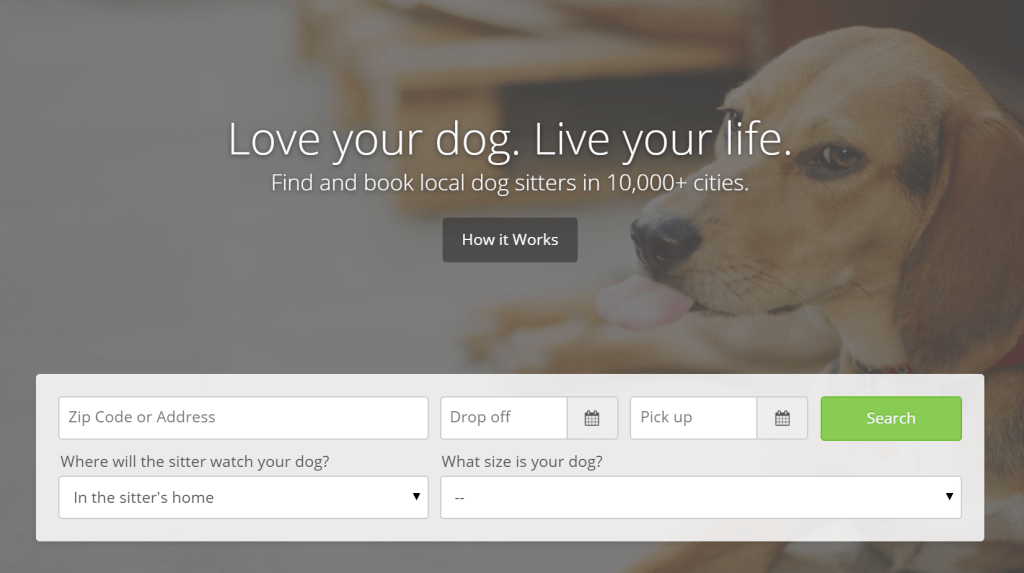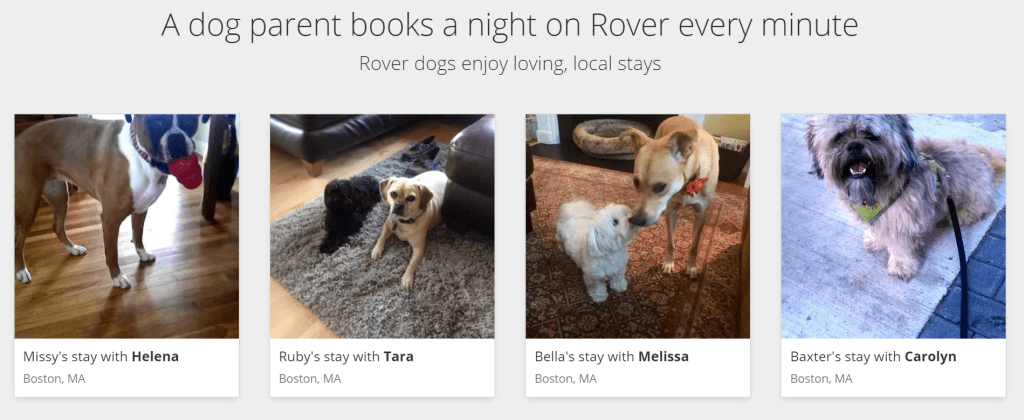LOVE YOUR DOG, LIVE YOUR LIFE: ROVER.COM OFFERS PET PARENTS A PEACE OF MIND

Rover.com provides a dog Airbnb service that connects pet sitters and pet owners.

If you read the recent edition of the Harbus, you probably have seen the love of my life featured on the last page. Weighing in at six pounds and a half, Mochi probably has more clothes and toys than your average child. Why, you ask? Because to others, she may be a fluff ball, but to me, she’s my whole world. If I never lived in Seattle, I would probably think I was a crazy dog lady, alone in my obsession over my “baby.” But Seattle is a city of dog-lovers and therefore, it is no surprise the city would serve as the home base for Rover.com, the leading in-home dog boarding service company.
Founded in 2011, Rover.com’s peer-to-peer model connects dog owners with approved dog sitters and provides an alternative to kennels or family and friends. Rover.com has been able to create value for both dog sitters and dog owners alike.
For those that work from home, work part-time, or able to take dogs to work, Rover.com is an opportunity to earn a few extra bucks. Dog sitters earn 85% of the total amount charged and Rover takes a 15% service fee. The margin is fairly attractive since many dog sitters already have pups of their own and can easily take on another without adding too much work. Rover.com also makes setting up the business of dog-sitting extremely easy. Dog sitters no longer need to set up his/her own website and create a marketing campaign – all the infrastructure is already there on Rover.com. Furthermore, Rover.com has insurance coverage for the guest pup with a $250 deductible and promises to cover the remaining amount up to $25,000.

For many dog owners like me, the thought of putting your cherished pup in a kennel sends shivers down your spine. All you can picture is the little one sitting in a cage wondering what they did wrong to deserve this abandonment. Rover.com offers owners the opportunity to contact sitters prior to committing for a “meet-and-greet” to ensure owners are comfortable with the arrangement. Although family and friends provide a cheap alternative to kennels, most people don’t want to inconvenience others and are often embarrassed to give close friends the laundry list of “101 Things That Make My Dog Happy” and even more embarrassed to ask friends to check off everything on the list. Rover.com makes this seamless. Owners upload a list (as long as you want!) to the pup profile (e.g., favorite food, allergies, sleeping habits, etc.) and this is automatically passed onto the sitter once the stay is booked. Owners are also sent daily pictures and mobile updates during the stay so you never have to feel too far away from your loved ones.

In addition, the fact that Rover.com collects payment from the dog owner prior to the stay and pays the dog sitter two days after the stay gives both sides a peace of mind and provides assurance that payment will be exchanged seamlessly. It is not uncommon for a dog sitter to use Rover.com’s services and for a dog owner to provide dog-sitting service. Therefore, an individual may be a benefactor of the value created for both sitters and owners.
The indirect network effect also benefits both sitters and owners. Since sitters establish their own rates, the more sitters, the more competition and easier for owners to find an available sitter or compare deals. Likewise, the more demand generated by owners, the more sitters are able to charge higher rates and fill up their availability. Rover.com also creates a platform of direct network effect. Owners are encouraged to leave a review after a stay is over, and by doing so, creates content for other owners to use in order to make a sitter decision.

Over the past four years, Rover.com has garnered 40,000 pet sitters in 10,000 U.S. cities. The company has experienced a 500 percent Y/Y booked revenue growth and doubled its employees. In March of this year, Rover.com raised $25MM in its Series E round, bringing the total funding to $50MM. Its closes rival, Dogvacay.com, was founded in 2012 and currently has 20,000 pet sitters in 3,000 cities. The two big players offer similar services to sitters and owners and have collectively increased awareness for pet Airbnb service. Most people who use one service have not heard of the other given the companies’ different focus on geographic expansion and the vast untapped market.
So far, Rover has been able to exploit its first-mover advantage to rapidly expand – with more than 92% of the population living a short drive from one of its sitters. However, the company will have to continue to provide a seamless and differentiated service to sitters and owners alike in order to withstand the new entrants that will undoubtedly come to “fetch” a piece of the multi-billion pet-sitting market.



I’m (unfortunately) not a dog owner, but wrote a post on DogVacay and found the similarities between the two companies very interesting. I currently struggle to see how Rover and DogVacay differentiate themselves, other than geographic location, which you discuss above. If both companies provide their service in the same city, I see the potential for multi-homing to be quite high. Granted Hosts build up a profile of reviews and ratings, but I do not view that as a major switching cost. I am curious how you view the potential impact of multi-homing and switching costs.
As a dog owner who had never heard of either of them, I agree that multi-homing may be an issue since I’m likely to check both now whenever I need a sitter. More concerning to me is the possibility of disintermediation both are exposed to. I once found a pet sitter on Craigslist who happened to live in my same apartment complex, and from then on called her directly whenever I need a sitter. Once I find someone I like and trust, so long as they’re available, I’m curious if you have any thoughts as to how Rover (or DogVacay) will keep my future transactions with the same sitter on their platform?
In a type of business being so dependent on network effect and where you have two similar competitors, I wonder if the only way for a business to survive is to eventually acquire its competitor. Otherwise, both businesses will reach a point where their churn rate is bigger than their new customers and would either go to a price war, or merge.
My dog stays in dog hotels/boarding facilities in and around Boston from time to time. Sophisticated boarding facilities in the area charge anywhere from $50-70 per night for a basic dog “suite”. I’ve tried Rover’s competitor, DogVacay, before and it works well. The value proposition is that you will save some money and your dog will likely have more fun (if you find a good sitter). As a result, I do think that the reviews and reputation will play a big role in determining a winner between Rover and DogVacay. Yes, multi-homing will occur, but I think the majority of dog owners will prefer the platform with the largest base of reliable dog sitters and review database.
With that said, disintermediation then becomes a big problem. Once the dog owners have a positive personal interaction with a sitter during a “doggie vacay”, the desire to use a different provider may only surface when your previous sitter is unavailable. This is a big risk. I haven’t used the platform in a while so maybe they are trying to remedy this now?
Great post, Joy! I found an interesting infographics comparing DogVacay and Rover (link below). Apparently, there are more dog-owning households than household with children in the U.S. In my opinion, there can be market for both (Uber vs. Lyft type of dilemma). The current VC money battle is tight. Rover received in total $50.9M (latest funding in March 2015) and DogVacay received $47M (latest funding in November 2014).
https://medium.com/@GregMuender/gone-to-the-dogs-dogvacay-vs-rover-infographic-65175169dee2